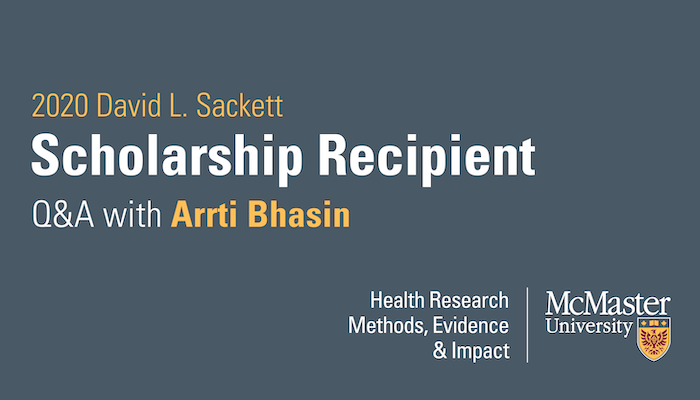The David L. Sackett Scholarship: Q&A with Arrti Bhasin

Arrti Bhasin is a PhD candidate in Health Research Methodology (HRM). Supervised by Dr. Michael Walsh, Arrti focuses on patient-centred outcomes and health care management systems in chronic kidney disease.
At HEI we pride ourselves on our collective ability to produce the best available health evidence, with the ultimate goal of bridging science to policy and practice and mobilizing new and better research methods. Describe your research and how it contributes to our overall mission.
Approximately two million Canadians suffer from chronic kidney disease (CKD), a multifaceted health problem associated with significant symptom burden and poor quality of life. Physical and psychological symptoms often go undetected or untreated in this patient population. Currently, Ontario is exploring the feasibility of a province-wide standardized approach to symptom screening in advanced CKD using patient reported outcome measures (PROMs), and the province is committed to fostering a kidney care system which supports patients’ mental health.
Our research informs the interrelatedness of symptoms in patients with advanced CKD, and how PROMs may be most useful in clinical practice. We will describe the variability of patient-reported symptoms over time and identify thresholds in individual symptom scores to indicate when an important change has occurred. We will also describe the current burden of mental health service use in CKD patients in Ontario, with a goal of highlighting gaps in mental health and kidney care. Our research will also contribute high-quality evidence to the fields of symptom and mental health research in CKD and inform models of care that incorporate a holistic approach to patients with complex diseases like advanced CKD.
What do you know about Dr. David Sackett and his enduring legacy?
Apart from his critical contributions to the fields of clinical epidemiology and evidence-based medicine, his prestigious accolades, and his high impact work in research methodology and clinical practice, I have heard from many that Dr. Sackett’s enduring legacy includes strong mentorship, patience, humility and good humour. When I have asked individuals about their interactions with Dr. Sackett, I have yet to hear an anecdote that was not delivered with a sense of admiration, did not mention his kind nature, and did not end in laughter. I often turn to Dr. Sackett’s written work when I am struggling to grasp a concept, and there is patience and simplicity in the way in which he explained complex theories. Dr. Sackett’s legacy is a reminder of what kindness, curiosity, innovation and collaboration can achieve in research and the betterment of society.
What does receiving the David Sackett Graduate Scholarship mean to you?
It is difficult for me to eloquently describe what this scholarship means. Dr. Sackett completed his clinical training in nephrology and strongly advocated for patient-oriented research. This makes this award even more special, as these are two areas that are very personal to me. Also, at a time where there is so much uncertainty in the world, this award has reignited a sense of motivation in me to continue to diligently work toward my goals. While this scholarship will act as a reminder for me of the importance of dedication and collaborative and innovative research, it will also remind me of the importance of enjoying the entire research process in a spirited manner, similar to the lightheartedness Dr. Sackett was known for. Receiving such a recognition is a remarkable honour and will forever be a key highlight of my career.
Do you have any advice for students who may be thinking about applying for the David Sackett Graduate Scholarship?
While I was initially drafting my research plan for my degree, I received sound mentorship advice to be mindful of the work I was planning and to ensure I was genuinely interested in exploring the proposed research questions and methods. I was also advised to regularly practice summarizing and communicating my passion, curiosity and commitment to my work. This is still difficult to do and is something I continue to work on over time. Not only have I seen some improvement in my written work, but it allows me to constantly reflect on my passion and goals and adapt my work accordingly to incorporate new areas I may be interested in exploring. Though this advice was not given to me specifically for this application, I believe it did assist me while applying for this scholarship.
If you could describe your experience at HEI in three words, what would they be and why?
I would describe my experience at HEI thus far as supportive, collaborative and invaluable. I began my journey as a student here in 2017. One of the first things I noticed was a strong sense of encouragement coming from everyone in the department, whether they were professors, administration or fellow peers. Everyone really wants to see one another succeed and many go out of their way to help and encourage you to push boundaries, grow as a researcher and establish a career profile. I have had the good fortune of receiving strong mentorship from my supervisor and other professors, and opportunities to collaborate with my peers. This has allowed me to continue to grow my network, learn new methodological skills and develop professionally. Through this experience, I have been given the opportunity to interact with and be inspired by some of the greatest minds. Since my arrival, I have built friendships that are truly supportive, and I continue to learn a lot about myself in the process.
Learn more about the David L. Sackett Scholarship here.
Uncategorized
